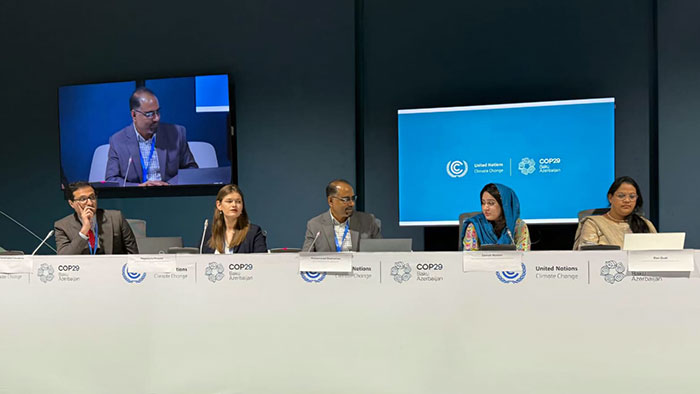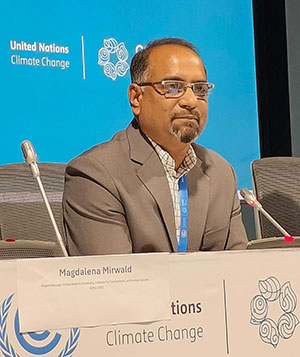 Mohammad Shahjahan, Director of Young Power in Social Action (YPSA), Bangladesh, actively participated in COP29, a pivotal platform for addressing global climate challenges. Shahjahan played a significant role in various meetings, discussions, and side events, advocating for climate justice for least-developed countries (LDCs) and highlighting the urgent need for policy frameworks to support climate-induced migrants.
Mohammad Shahjahan, Director of Young Power in Social Action (YPSA), Bangladesh, actively participated in COP29, a pivotal platform for addressing global climate challenges. Shahjahan played a significant role in various meetings, discussions, and side events, advocating for climate justice for least-developed countries (LDCs) and highlighting the urgent need for policy frameworks to support climate-induced migrants.
On November 19, 2024, Shahjahan served as a panelist at a side event titled “Youth and Nature Positive Climate Action in Urban Settlements in South Asia.” Co-organized by YPSA, the event focused on the intersection of urbanization, climate resilience, and social inclusion in South Asia. Shahjahan highlighted findings from YPSA’s research on climate-forced displacement and its impact on urban migration, using Chattogram City as a case study. Shahjahan shared alarming statistics that 30% of migration to Chattogram City is climate-induced, primarily due to river erosion, cyclones, and floods. Migrants face severe challenges, including the loss of property, social ties, and dignity, compounded by inadequate housing and resources in urban areas. He urged global leaders to recognize climate-forced displacement as a distinct agenda item under the UNFCCC; integrating funding for loss and damage into the New Collective Quantified Goal (NCQG) to ensure financial support for adaptation and resettlement and promote sustainable urban planning with a focus on green infrastructure, renewable energy, and low-carbon housing solutions.
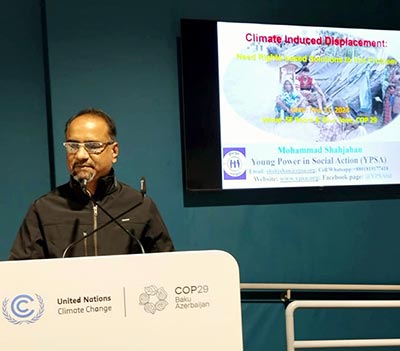 On November 21, 2024, he participated in another side event “Climate Change-Induced Displacement and Migration: Consequences and Policy Responses” as a keynote presenter. At this side event, Shahjahan delivered a compelling presentation on the Climate Induced Displacement that needs Rights-based Solutions. He highlights socio-economic impacts of climate-induced displacement and migration in Bangladesh. Drawing from YPSA’s extensive research and advocacy experience, he emphasized the Magnitude of Displacement, the interrelation among Adaptation, Displacement and Migration, and the situation of trapped people living in temporary settings (roadside, embankment side, other lands) after being displaced due to climate change impact without having basic rights and needs. He advocated for a robust policy framework under the UNFCCC to address climate-induced migration, including legal recognition and financial support for displaced individuals.
On November 21, 2024, he participated in another side event “Climate Change-Induced Displacement and Migration: Consequences and Policy Responses” as a keynote presenter. At this side event, Shahjahan delivered a compelling presentation on the Climate Induced Displacement that needs Rights-based Solutions. He highlights socio-economic impacts of climate-induced displacement and migration in Bangladesh. Drawing from YPSA’s extensive research and advocacy experience, he emphasized the Magnitude of Displacement, the interrelation among Adaptation, Displacement and Migration, and the situation of trapped people living in temporary settings (roadside, embankment side, other lands) after being displaced due to climate change impact without having basic rights and needs. He advocated for a robust policy framework under the UNFCCC to address climate-induced migration, including legal recognition and financial support for displaced individuals.

Shahjahan participated in different climate justice movements, collaborating with global advocates to demand increased climate finance for LDCs. He emphasized the inclusion of loss and damage as a separate pillar in the New Collective Quantified Goal (NCQG), grant-based funding of $1.3 trillion annually until 2030 to support adaptation and mitigation, and legal frameworks for addressing cross-border climate migration under the UNFCCC.
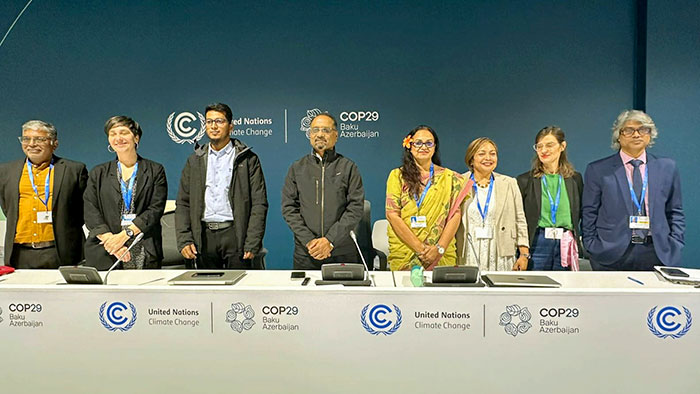
He also engaged in multiple dialogues on climate finance, emphasizing the need for equitable access to funds. He highlighted the disproportionate climate impacts on Bangladesh and similar nations, advocating for equitable access to climate finance and solutions rooted in justice and human rights. He urged developed nations to prioritize grant-based financing over loans to prevent further economic strain on vulnerable nations focusing on addressing loss and damage alongside mitigation and adaptation.
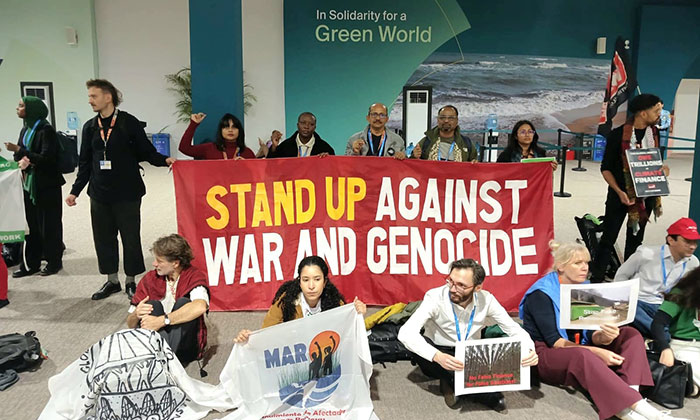
Mohammad Shahjahan’s contributions at COP29 underscored the urgent need for global action on climate-induced displacement and urban resilience. His advocacy amplified the voices of vulnerable communities, pushing for equitable climate policies and sustainable urban development. Through his active engagement, Shahjahan demonstrated YPSA’s commitment to advancing climate justice and building a resilient future for the least-developed countries.

